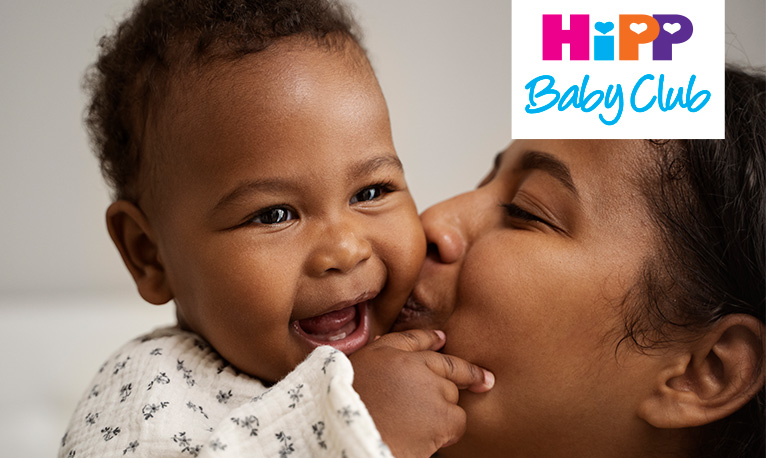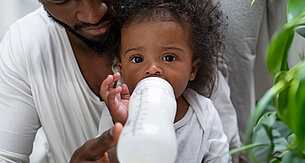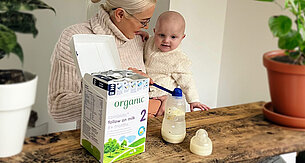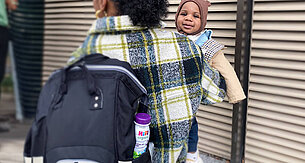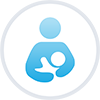Preparing Formula Feeds in Advance
Reviewed on 10.07.2024
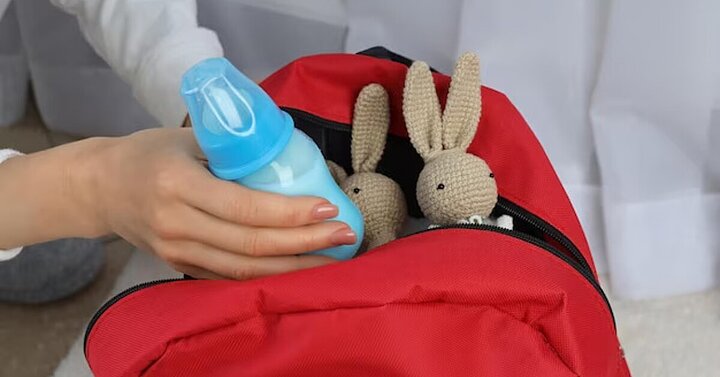
There’s so much to think about when you’re taking your baby out and about. Do you have enough nappies? Wipes? And what about formula? No one wants to get caught out with a hungry baby, but how do you ensure you are safely prepared for the day?
If you are using powdered formula as opposed to premade formula, it’s important that the correct steps are followed to ensure the milk remains safe to feed your baby. When formula is left too long, bacteria can develop potentially making your little one unwell. In this guide we explain the steps to preparing formula feeds in advance, ready for getting out and about.
What is needed for formula feeding when on the go?
Several things need to be considered when travelling; How far you will be going, how long you are going to be out or away for, how you are travelling, and how often your baby is feeding. This will help you determine how much equipment to take with you and what exactly you’ll need. There are two options in terms of formula; either premade formula which can be decanted into a sterilised bottle and given to the baby straight away, or powdered formula which will need to be mixed with boiled water.
To use powdered formula, you’ll need:
- A clean vacuum flask filled with freshly boiled water, straight from the kettle. (The flask doesn’t need to be sterilised, but should be clean and dry and only used for feeds)
- A pre-measured amount of formula powder in a small, clean, dry container
- An empty sterilised bottle, with teat and lid in place
When you need to prepare the feed on the go, find yourself a clean spot to do so. The steps to making up a powdered feed are as follows:
- Wash your hands
- Carefully pour the required amount of hot water from the flask into the sterilised bottle. (The flask will keep the water above 70C for several hours.)
- Add the pre-measured powder into the bottle, put the teat and lid back on and shake until the powder is dissolved (about 15 seconds)
Make up a fresh feed only when your baby needs it, and remember to cool the feed to drinking temperature (approx 37°C) by holding the bottle under cold running water. Feed immediately, and ALWAYS test the temperature of the milk before feeding. You can do this by pouring a few drops on the inside of your wrist.
How to prepare a bottle of formula in advance
Can you pre make formula? This is a question we are asked often. On some occasions, it may not be possible to take the boiled water and milk separately. There may be instances where a pre-prepared feed is required. You may have questions such as “how long can I keep formula milk in the fridge?” or “how long can you keep powdered formula once made up?” Although preparing formula in advance of a trip is not ideal, if it's necessary, keep reading to ensure the safety guidelines are met.
Make up the formula as close to travelling as possible, remembering that the cooled formula can only remain in the fridge for 24 hours.
How long can formula stay out of the fridge and what about prepared formula milk storage?
It’s very important to take note of the current guidance surrounding formula milk storage and how long it can stay out of the fridge. When you are travelling, take the premade formula bottle of the fridge just before you leave and carry it in a cool bag with an ice pack, and use it within four hours. If you don't have an ice pack, or access to a fridge, the made-up formula must be used within two hours.
If made-up formula is stored:
- In a fridge – use within 24 hours
- In a cool bag with an ice pack – use within four hours
- At room temperature – use within two hours
This advice works for nursery days, or days out. But what if you’re going further afield, how long does formula last in a bottle, particularly if you’re off somewhere on a flight?
Flying with a bottle-fed baby
There are a few things to keep in mind when planning your first adventure with your little one. Here are our top travel tips for formula feeders.
If you're flying, there's some good news: the 100ml carry-on limit for liquids doesn't apply to formula milk or baby foods. This means you can bring a reasonable amount of each to meet your baby's needs for the journey. There’s no legal limit to how much baby milk and sterilised water you can take however check with your airport before you travel.
We recommend packing travel-size ready-made formula bottles or, if using powdered formula, several feeding bottles along with pre-measured powder in clean containers. You can then mix with boiled water at the airport or during the flight.
Alternatively, you can wait until you've gone through security and purchase ready-to-drink baby formula at an airport chemist. Most UK airports, including Gatwick and Heathrow, will even let you reserve some in advance for your journey. This is a far more convenient option.
Remember to pack or buy enough formula to cope with any flight delays you might encounter – they're bad enough without adding a hungry baby to the mix!
During your flight, you might want to also offer your baby occasional drinks of cooled, boiled water; the dry atmosphere on an airplane is very dehydrating, and it can affect babies much more quickly than adults.
Things to remember when on holiday with a formula-fed baby
Once you've arrived, there are a few things to remember before you and your baby hit the beach or the pool.
Can I use bottled water for formula milk?
The current advice is to avoid using bottled water to make up formula feeds. Bottled water is not sterile, and even if you boil it, still may contain too much sodiulm (salt) and sulphates. This may become tricky if you are abroad as tap water may not be suitable either as it might well have different levels of minerals than your baby is used to at home.
To prevent a tummy upset, use bottled water with less than 200 mg of sodium (Na) and less than 250 mg of sulphate (SO4) per litre for mixing formula. These bottled waters will still need to be boiled and cooled first. Check the labels when shopping abroad for bottled water or take enough premade formula with you just incase.
Sterilising abroad
For babies under 6 months, bottles and teats must still be sterilized. Instead of bringing an electric sterilizer, consider cold-water sterilizing tablets or a compact microwave sterilizer if you have access to a microwave. If you're into more minimalist travel, you could always opt for disposable, pre-sterilised bottle liners and teats.
Finding your formula brand
If you're travelling in Europe, you might see your brand of formula in the local shop, but there may be some slight compositional differences compared to the formula you buy in the UK. Your safest bet is to pack enough formula powder for your entire trip in your hold baggage, plus a bit extra. (This isn't a bad thing; remember you can use the extra space on the way home to fit in all your holiday shopping bargains!).
If you're heading off for the day, pack several empty sterilised bottles, alongside pre-measured formula powder in small clean, dry containers, and a vacuum flask of just-boiled water. The water should stay above 70C for several hours in a flask that is full and sealed. Make up a fresh feed only when your baby needs it, and remember to cool the feed to drinking temperature (approx 37°C) by holding the bottle under cold running water. Feed immediately, and ALWAYS test the temperature of the milk before feeding.
Stay hydrated
If it's going to be hot where you're going, keep in mind that babies can become dehydrated much more quickly than adults. Offering a bottle or cup of cooled, boiled water in between feeds will help keep your little one happy and healthy.

